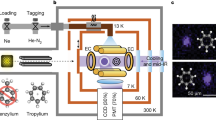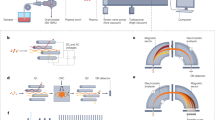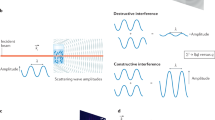Abstract
MUCH work has been done on damage in solids caused by particulate and non-particulate radiation; however, the subsequent effect on the environment has been neglected. I have demonstrated1–3 that material can be transferred to an emitter whose electrons bombard a solid, and that single atoms and complexes liberated can be detected by the fluctuations they cause in the field emission when they impinge on the emitter. The present work was directed to detecting, recording and identifying these entities; in short, to the design of a single atom spectrometer.
This is a preview of subscription content, access via your institution
Access options
Subscribe to this journal
Receive 51 print issues and online access
$199.00 per year
only $3.90 per issue
Buy this article
- Purchase on Springer Link
- Instant access to full article PDF
Prices may be subject to local taxes which are calculated during checkout
Similar content being viewed by others
References
Jacob, L., Nature, 157, 586 (1946).
Jacob, L., Nature, 198, 774 (1963).
Jacob, L., Nature, 211, 633 (1966).
Author information
Authors and Affiliations
Rights and permissions
About this article
Cite this article
JACOB, L. The Single Atom Spectrometer and its Application in Chemistry and Biology. Nature 241, 216–217 (1973). https://doi.org/10.1038/241216a0
Received:
Revised:
Published:
Issue Date:
DOI: https://doi.org/10.1038/241216a0
This article is cited by
-
Influence of Q- and G-banding on the Feflgen-stainability of human metaphase chromosomes
The Histochemical Journal (1977)
Comments
By submitting a comment you agree to abide by our Terms and Community Guidelines. If you find something abusive or that does not comply with our terms or guidelines please flag it as inappropriate.



